Is it Profitable to Own an Airbnb? Airbnb Ownership Guide

The idea of owning a short-term vacation rental can be enticing, but is Airbnb profitable in reality?
It's no secret that Airbnb has exploded in popularity, with over five million Airbnb hosts now renting out properties across the globe. In 2023 alone, more than 448 million bookings were made on the Airbnb platform — almost double the number from the previous year!
But as exciting as it sounds, making money on Airbnb isn't guaranteed. Is Airbnb profitable? Let's explore what it really takes to make Airbnb a smart investment.

Key Property Considerations for Airbnb
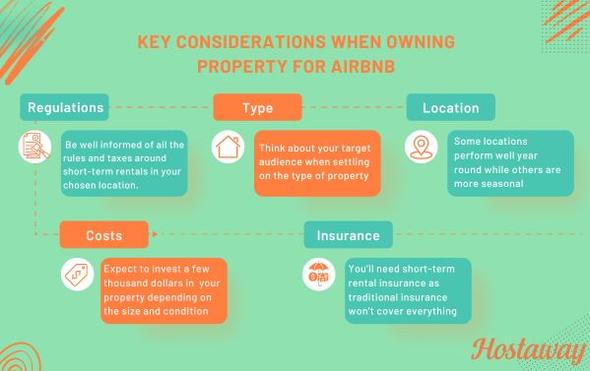
Property location and demand
One of the most critical factors in determining profitability is location. Popular tourist destinations, major cities like San Francisco and San Diego, urban centers, and vacation hotspots tend to perform well due to high demand. However, smaller towns or rural areas can also be profitable if they cater to a niche market or seasonal travelers.
For instance, a vacation home near a national park might see a surge in bookings during hiking season, while urban properties can benefit from high season or year-round demand for business or leisure stays.
Property type
Not all properties are created equal when it comes to short-term rentals. The type of property you own or plan to buy plays a significant role in its profitability. Here are some common types:
Single-family homes: These tend to perform well with larger groups or families, especially in vacation destinations.
Condos or apartments: Ideal for urban areas with limited space but high demand.
Unique properties: Cabins, tiny homes, and other unique listings can attract travelers looking for memorable stays, often commanding higher prices.
Consider the target audience your Airbnb property would attract. Families, business travelers, solo adventurers, and couples all look for different amenities, so align your property with your target audience.
Local regulations and licensing
Before you get too excited about potential profits, make sure your location allows short-term vacation rentals. Many cities have strict regulations or outright bans on Airbnb listings. Some popular cities impose limits on the number of days you can rent your property. Others may only require special permits or business licenses.
Ignoring these regulations can lead to hefty fines or forced delisting, so familiarize yourself with zoning laws, short-term rental permits, and the tax implications of rent and hosting guests.
Initial costs
Getting your property ready for Airbnb isn't just about listing it on the platform. You'll need to invest in property acquisition if you're buying a home specifically for short-term rentals. This includes:
Down payment and closing costs.
Furnishing and interior design to make your listing stand out. A well-furnished home with modern amenities can increase bookings and command higher nightly rates.
Cleaning supplies and maintenance materials.
Expect to invest a few thousand dollars in these areas depending on the size and condition of the rented property. Airbnb travelers expect a clean, comfortable, and well-decorated space, so skimping on setup costs can harm profitability in the long run.
Insurance and safety measures
Standard homeowner's insurance often doesn't cover short-term rentals, meaning you'll likely need special short-term rental insurance. These policies protect you from liabilities like property damage and guest injuries, which can save you from financial disaster.
Safety features such as smoke detectors, fire extinguishers, and first aid kits are also necessary for compliance with Airbnb's safety standards and to protect your guests.
Cost Breakdown and Management
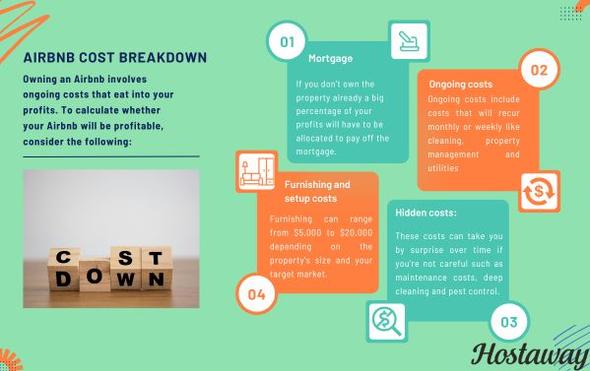
Owning an Airbnb involves ongoing costs that eat into your profits. To calculate whether your Airbnb will be profitable, consider the following:
Mortgage: Unless you own the property outright, the bulk of your monthly expenses will likely go toward the mortgage.
Furnishing and setup costs: Furnishing can range from $5,000 to $20,000 depending on the property's size and your target market. Think stylish but durable furniture, quality bedding, and essential kitchen items.
Ongoing costs:
Cleaning: You'll either need to hire a cleaning service or have to clean the property yourself.
Property management: If you plan to hire a property manager, you may need to pay between 10% and 30% of the rental income.
Utilities: You'll need to cover the costs of electricity, water, internet, and possibly other services. These costs can vary but average around $200-$500 a month.
Hidden costs:
While most Airbnb hosts focus on the obvious expenses, some hidden fees and costs can surprise you:
Repairs and maintenance: Expect wear and tear from guests, so budget for regular repairs and upkeep.
Deep cleaning: Properties will occasionally require deep cleaning services, especially if you host large groups or long-term stays. Pet-friendly properties may need more frequent or specialized cleaning services.
Pest control: Budget for pest control, especially if your property is located in areas prone to insects or wildlife.
How to Make Your Airbnb Investment Profitable
To make a significant net profit, you need to actively manage both costs and revenue. Here are practical tips to help you cut expenses and boost your potential earnings, as an Airbnb host.
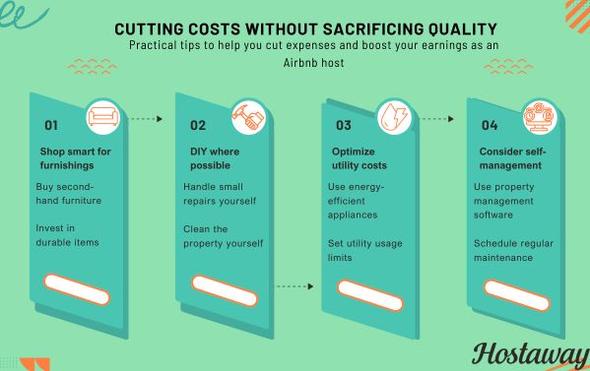
While it's tempting to focus on revenue, keeping your operating costs low is equally crucial. Here's how you can trim expenses without compromising the quality of your guest experience:
Shop smart for furnishings
Buy second-hand furniture: Platforms like Facebook Marketplace, Craigslist and local thrift stores offer gently used furniture at a fraction of retail prices. You can still create a stylish space on a budget and guests won't notice the difference.
Invest in durable items: While it might seem counterintuitive to spend more upfront, buying quality, durable items (like a sturdy sofa) reduces the need for frequent replacements, saving you money over time.
DIY where possible
Handle small repairs yourself: If you're handy, tackle minor repairs and maintenance tasks to avoid hiring a contractor for every fix.
Clean the property yourself: Instead of hiring a professional cleaning service after every guest, do it yourself if you have the time. While it's labor-intensive, this can save you $50 to $150 per turnover.
Optimize utility costs
Install energy-efficient appliances and smart devices: LED light bulbs, smart thermostats and energy-efficient appliances reduce utility bills.
Set utility usage limits: Establish guidelines for heating, cooling or water usage within reasonable limits to prevent guests from leaving air conditioning or heating running all day.
Consider self-management
Use property management software like Hostaway: Instead of hiring a full-time property manager, which typically costs 10-30% of your revenue, consider managing the property yourself using automation tools. With Hostaway's platform, you can automate guest communication, check-ins and dynamic pricing — all without the need for costly management services.
Schedule regular maintenance: Performing routine maintenance can prevent costly repairs. Regularly check for small issues like plumbing leaks or appliance malfunctions before they become more expensive to fix.
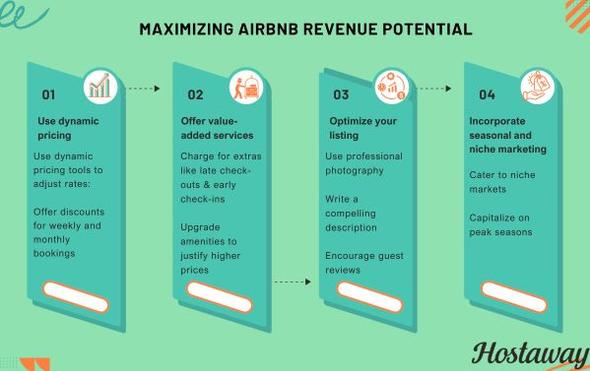
Maximizing revenue potential
Now that you've got your costs under control, it's time to focus on boosting your revenue. Here's how to maximize your Airbnb's earning potential:
Use dynamic pricing
Use pricing tools to adjust rates: Dynamic pricing tools like Hostaway dynamic pricing help you set optimal rates depending on demand. Lower your prices slightly during off-peak times to encourage more bookings and raise them during peak seasons when demand is higher.
Offer discounts for longer stays: Incentivize guests to book longer stays by offering small discounts for weekly or monthly bookings. This can reduce the number of unbooked nights and increase your overall occupancy rate.
Offer value-added services
Charge for extras: Don't be afraid to charge additional fees for optional services like pet fees, early check-ins or late check-outs. Adding these extras at a reasonable cost can boost your income without raising your nightly rate.
Upgrade your amenities: Adding high-demand amenities like premium Wi-Fi, a Netflix account or outdoor seating can justify higher nightly rates. Some hosts even offer welcome baskets, stocked fridges or luxury toiletries to enhance the guest experience and encourage higher bookings or tips.
Optimize your listing
Use professional photography: Listings with high-quality, professional photos consistently get more bookings. Show your property in the best light by investing in professional photography with clear, well-lit photos.
Write a compelling description: Your property's description should highlight not only the features of the home but also local attractions. Tailor your description to your target audience.
Encourage guest reviews: The more positive reviews you have, the higher your property will rank in Airbnb's search results. After a guest leaves, follow up with a polite message encouraging them to leave a review if they enjoyed their stay.
Incorporate seasonal and niche marketing
Cater to niche markets: If your property is near a popular event venue, conference center or natural attraction, market it to travelers attending those events or activities. For example, if your area hosts an annual festival, create listings that cater specifically to festival-goers, offering event-themed packages or suggestions on what to do in town.
Capitalize on peak seasons: Understand high and low seasons for your location and adjust your marketing efforts accordingly. For example, during summer vacation months, focus on family-friendly features, while business-friendly amenities may appeal more during the off-season.
Strategies to Increase Airbnb Profitability in The Long-Term
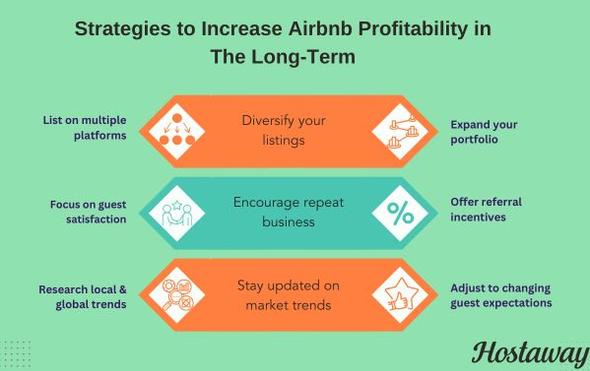
Beyond just cutting costs and raising prices, consider these longer-term strategies for scaling your Airbnb business:
Diversify your listings
List on multiple platforms: Don't limit yourself to just Airbnb. Listing on multiple platforms increases your property's visibility and occupancy.
Expand your portfolio: Once your first property is profitable, consider scaling up by acquiring more properties in different markets. Diversifying your investment reduces the risk tied to one location's seasonality or regulations.
Encourage repeat business
Focus on guest satisfaction: Happy guests are likely to become repeat customers or recommend your property to others. By maintaining high standards for cleanliness, communication and amenities, you can build a loyal customer base.
Offer referral incentives: Provide discounts or incentives to past guests who refer new customers. Word-of-mouth referrals are valuable, as they often bring in trustworthy guests who are familiar with your property through a friend's recommendation.
Stay updated on market trends
Research local and global trends: The short-term rental market is constantly evolving. Keep an eye on how regulations, pricing and guest preferences are changing in your area.
Adjust to changing guest expectations: As remote work becomes more common, there's been a rise in long-term stays and “workcation” travelers. If your property can accommodate remote workers with fast internet, dedicated workspaces and discounted long-term rates, you can tap into this growing market segment.

Is Owning an Airbnb a Good Investment?
Owning an Airbnb can be a profitable venture, but it's not without its challenges. Success hinges on careful planning, cost management and a smart strategy for maximizing revenue. By focusing on location, optimizing your pricing, offering attractive amenities and keeping operational costs low, you can turn a short-term rental into a thriving business.
While it's essential to keep a finger on the pulse, tools like Hostaway can simplify the management process, allowing you to scale efficiently. With the right approach, owning an Airbnb can definitely be a rewarding and lucrative investment.
Ready to find out how Hostaway can transform your business?
